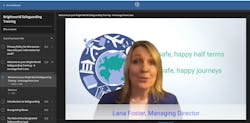keeping everyone trained in safeguarding

Every year at the Bright World conference, all members of the guardianship Head Office and Local Coordinator teams receive an update on safeguarding training. Our Head Office team members also benefit from Safer Recruitment Training and our Designated Safeguarding Leads have additional training every two years. We also review our Safeguarding and Child Protection Policies together at least once each year.
This may seem excessive, and it is certainly a big investment and commitment for us but it really is worth it. It is important to remind ourselves of everything we have learnt before, what to do if we have concerns about a child under our care and to keep up to date with new laws, policies and terminology in the safeguarding world.
What does Safeguarding training teach us?

It teaches us what constitutes child abuse and neglect and how we can learn to spot signs that something is not right. Without training, which includes examples of behaviours and signs, we would not be able to notice things and they may go undetected. Many may question why our students, perceived all to be from privileged backgrounds and attending expensive and high quality schools who take good care of them, would possibly be subject to abuse or neglect.
We would remind them that international students sent to the UK without their parents are vulnerable and may be exposed to any number of situations where they may be abused. Cyberbullying is one area that they are particularly susceptible to as we have learnt over the years working with some of our students who have been victims of online fraud.
spotting that something is wrong

A child who is being subjected to any form of abuse may well not feel able to tell anyone. They may be ashamed of something that they have done online that has led to them being cyberbullied or a victim of fraud. They may have been told not to tell anyone or they just may not think anyone will believe them.
Despite sometimes not talking about it, we learn from our training that they can show signs in different ways. They may stop taking care of themselves and look unclean and unkempt; they may lose or gain a lot of weight; they may be withdrawn and quiet when they used to be loud and confident. These changes can go undetected by people who see them every day at school but for our Local Coordinators and our host families who only see them a few times each year, they can really help in noticing that something is not quite right. They, in turn, know to report any concerns onto us, who in turn can inform their parents and the school.
Safer Recruitment Training – what is that all about?

Safeguarding means doing all you can to prevent harm coming to children. With host families, drivers and Local Coordinators coming into contact with the children under our care, it is important that we understand the dangers of recruiting people who may be inappropriate. Safer recruitment training allows us to learn from the past by looking at case studies of where things have gone wrong, and helps us write the correct policies and ask the right questions when we are recruiting volunteers and staff. Laws and guidelines are constantly being updated and so it is important that we have refresher training on Safer Recruitment at regular intervals.
safeguarding training for our host families and drivers

It is so important that our host families understand safeguarding and signs to watch out for if there is something wrong when they are hosting children under our care.
We have had a situation where a host family reported to us that they are concerned about the eating behaviours of a student. The student had become very thin since their last visit and was not eating properly with the family. We were able to work with the school and the student’s Mother who came to live in the UK with the child whilst she undertook specialist counselling. This meant she could still attend school but get proper help and stay with her Mum each night. We are pleased to report that she overcame her issues well enough to return to full boarding and complete her education. If it wasn’t for the host family noticing the changes and issues and reporting it to us, then we would never have been able to help her.
Professional Curiosity

Professional curiosity means ‘thinking the unthinkable’ and not taking a situation or the explanation for something that has happened at face value. Previously a term mainly used for social workers when dealing with UK families, the term is now being adopted and used in the 2022 Keeping Children Safe in Education guidance (KCSIE). As guardians, we reference this guidance frequently and realise the need to delve deeper into situations with a questioning mind in order to ensure that our students are listened to and any of their concerns are dealt with thoroughly. We will be looking more into Professional Curiosity and what it means in subsequent articles.
I have been having regular safeguarding training for more than 15 years and I can wholeheartedly say that I learn something new every time I have a training update. It is so important for all staff and volunteers at Bright World to understand the principals of safeguarding. It is also very important to understand our Child Protection policy and process and what to do in an emergency or if they have concerns.

ask for more information about our host family and driver training programme
Apply for guardianship


